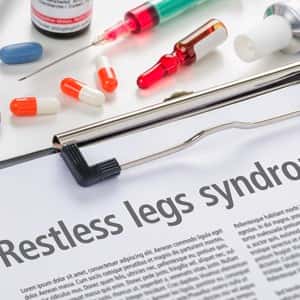
“Restless legs syndrome” (RLS) almost doesn’t sound like a medical condition. But if you ask someone who suffers from this condition, you’ll learn that it can interfere with sleep and thus impair quality of life pretty significantly. Until the very end of the 20th century, doctors had little to offer a person with RLS or its cousin, periodic limb movement disorder (PLMD). Now, however, a handful of drugs are used to treat this recurrent, relentless urge to move the legs. RLS is especially troublesome at night while sleeping. How good is gabapentin for restless legs?
Gabapentin for Restless Legs Syndrome:
Q. What can you tell me about gabapentin for restless legs syndrome? I find it very helpful. Are there side effects I should watch for?
A. Gabapentin enacarbil (Horizant) has been approved by the FDA for the treatment of restless legs syndrome (RLS) and postherpetic neuralgia (the pain that can linger after a bout of shingles). It is different from plain gabapentin (Neurontin or Gralise). The official prescribing information warns that Horizant “may cause significant driving impairment.” Because you might have trouble assessing your own coordination and reaction times, we would advise against driving while taking this medicine.
Other Possible Gabapentin Side Effects:
Other symptoms to be aware of include dizziness, sedation, fatigue, confusion (“feeling drunk”), depression, fluid retention, digestive upset, nausea, dry mouth, insomnia, blurred vision and headaches. This medication triggers suicidal thoughts in some people, estimated to be 1 in 500. If that happens, the prescriber should be contacted immediately.
Occasionally a patient has a life-threatening reaction to this drug, signaled by yellow skin or eyes, hives or skin rash, unusual bruising, fever, swollen glands, recurrent infections, debilitating fatigue and severe unexpected muscle pain. Such symptoms call for emergency medical attention.
One reader wrote that gabapentin left him with brain fog, word retrieval issues and sexual problems. Stopping suddenly caused depression, irritability, pain and sweating.
Other Treatments for RLS:
There are several other drugs that doctors may prescribe to treat restless legs syndrome. These include pregabalin (Lyrica), pramipexole (Mirapex), ropinirole (Requip) and rotigotine (Neupro). Each of these has its own set of side effects.
Non-Drug Approaches:
Sometimes taking iron to correct anemia makes RLS go away. A blood test for iron deficiency might be the first step in a workup.
Readers have found a number of home remedies can sometimes be helpful. In that vein, we have heard about soap under the bottom sheet, tart cherries and ginger.

